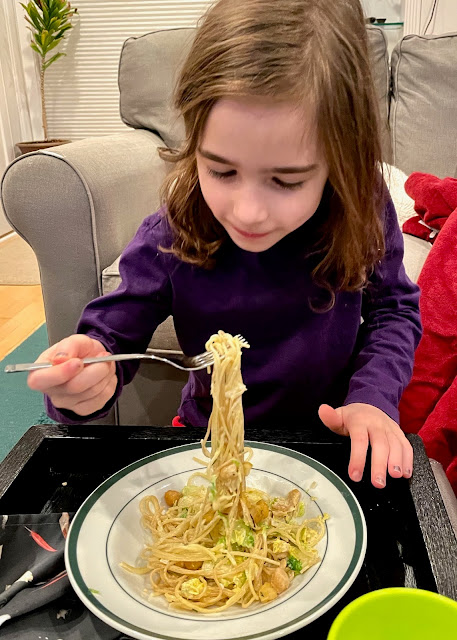A Tale of Two Chickpea Pastas
I recently made two different vegetarian pasta dishes with chickpeas. One was better than the other.
The better-tasting version was "Creamy Chickpea Pasta With Spinach and Rosemary" (NYT Cooking; subscription required). Why was it better? Well for starters, it has a cup of heavy cream. Creammmmmmmm! But also, a crisped chickpea is the best kind of chickpea (see also this stew).
I substituted Brussels sprouts, thinly sliced in the food processor, for spinach. It worked fine, but I think spinach would be better.
Compare that dish above with the undistinguished "One-Pan Orecchiette with Chickpeas and Olives" (Martha Stewart), below.
I like olives a lot, and one-pot meals are a dream come true, but this just wasn't very good, we thought. You know what might be great? Adding olives to the NYT Cooking version!
I have been feeling disheartened lately at hearing policy solutions to address climate change described as politically motivated (see, for example, the reactions to meatless school lunches in Lyon, France or the resistance by some Republicans to the US Fed's climate change response efforts) or politically unfeasible (The Guardian noted, for example, that "hopes of sweeping climate legislation appear remote in a finely balanced Senate where climate denialism is still rife").
Scientists have been clear that we face a climate crisis. A poll showed that a majority of US voters support efforts to address the problem; another showed that "Addressing climate change and preserving clean air and water landed in respondents' top 5 personal priorities for the future of the US." Yet the disheartening news items lead me to believe that plenty of policymakers and others want to perpetuate a political divide, rather than work together toward solutions to a problem that is increasingly affecting people everywhere.
That's why I keep showing up here: to offer one solution to one aspect of climate change, and to ask you to join me. Greenhouse gas emissions from food systems are a policy problem that requires a policy solution, but those of us who are not policymakers can do our own small part by minimizing our meat and dairy consumption.


Comments
Post a Comment